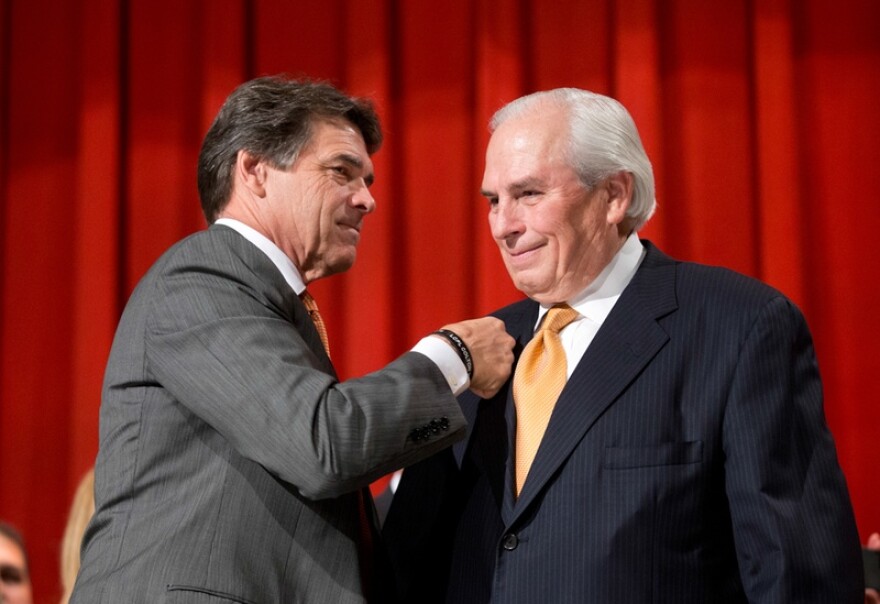As the University of Texas System Board of Regents convenes for its annual August meeting Wednesday and Thursday, a gathering fraught with tension and anxiety is all but assured.
The nine regents have been bathed in controversy for more than two years, and — despite racking up a number of accomplishments, including the creation of a major new university in South Texas — have only managed to sink deeper over time.
At this week’s meeting, closure may come into view for some high-profile investigations. But disagreements persist, the threat of impeachment looms over one member, and uncertainty about the board’s relationships with Bill Powers, the president of the University of Texas at Austin, and Gov. Rick Perry is an ongoing source of concern.
In the last year, the regents formed two task forces to examine the underlying issues pertaining to scandals at the system's flagship. One involved a now-defunct forgivable loan program for faculty run by the University of Texas Law School Foundation, and the other stemmed from the revelation that a UT-Austin coach engaged in an inappropriate relationship.
Both the Task Force on Best Practices Regarding University Affiliated Foundation Relationships and the Task Force on Employee/Student Relationships are scheduled to provide updates on their work — and the former may propose some rule changes — on Thursday. A third task force, on how to update the system’s approach to engineering education, is also slated to make a presentation.
But while those endeavors appear to be approaching their respective conclusions, others — which may largely go unaddressed at the meeting — appear to be ramping up.
Attorneys for Regent Wallace Hall, who is being investigated by a legislative committee tasked with considering filing articles of impeachment against him, recently submitted a letter to lawmakers laying out some of the motivation for their client's headline-making activities.
Hall has devoted a significant amount of time to and developed a reputation for digging into UT-Austin's operations. In the process, the letter asserted, he has “discovered areas in which the University falls short in its disclosure and transparency duties, has engaged in secret favoritism in faculty compensation and student admissions, and misreports its gifts and financial condition.”
Multiple lawmakers have described Hall’s activities as a “witch hunt.” But in a recent email to his friends, Jeff Sandefer, an Austin businessman and unofficial adviser to Perry on higher education issues, described the Hall's ongoing efforts — despite legislative opposition — as an example of “bravery under fire.”
State Sen. Judith Zaffirini, D-Laredo, a staunch defender of the university, said the letter did not persuade her to change her tune. “The universal reaction to that letter was, ‘That’s it?’” she said, describing Hall’s motives as “four weak reasons, none of which is directly attributed to Bill Powers.”
For example, with regard to an incident cited by Hall’s attorney in which an unnamed state senator allegedly succeeded in securing “special consideration” for an applicant to the university in order to overturn an initial rejection, Zaffirini said, “I can’t think of one senator who would use undue influence to have a student admitted. Not one.”
She said there was a difference between a recommendation and an abuse of power.
“Any letter or recommendation, whether it is based on academic, professional, personal or political relationships simply opens the door for a student,” Zaffirini said. “It calls attention to a student’s accomplishments from the letter-writer’s perspective. And any student is going to use his or her best connections.”
As a result of Hall's investigation, the system confirmed last week that its Office of General Counsel has initiated an internal inquiry into concerns raised about preferential admissions. Hall’s list of grievances is also of some import heading into the meeting because August is when the presidents of the system’s universities have their annual job performance reviewed.
Powers, who clearly has a tense relationship with some board members and whose job has been rumored to be at risk prior to multiple meetings in recent years, will not be in attendance: He opted to take a vacation this week. Regardless, the legislative committee investigating Hall has instructed the board not to take any negative employment action against those with potential ties to their investigation, including Powers.
But the meeting will still feature some personnel changes. Jeff Hildebrand of Houston, a new regent, takes his seat at the board table for the first time. During a lengthy confirmation hearing in the spring, Hildebrand — along with new regent Ernest Aliseda of McAllen and Paul Foster of El Paso, who was re-appointed to the board — was urged by state Sen. Glenn Hegar, R-Katy, to “move beyond the controversy.”
The agenda for the meeting leaves open the possibility for a reshuffling of the board's leadership. Members are scheduled to discuss "individual personnel matters associated with the organization of the Board of Regents and the election of officers."
How different a board might behave under a new chairman or vice chairmen remains to be seen.
Perry nominated all the regents, and when a new chairman is chosen, the governor typically guides the selection. Emails obtained by reporters have repeatedly indicated that Perry is less inclinded than other politicians to move beyond the tension.
The Houston Chronicle recently uncovered a February email to a select cohort of regents, including Hall, in which the governor advised them to “not be outlawyered” and suggested that Powers and his allies were “deep into misinformation.”
In a March email to select regents, Perry compared the ongoing controversy at the system to the Battle of the Bulge and declared that “the fight is being won.” He described the opposition as “charlatans and peacocks.”
Zaffirini, at least, is reserving judegment — for now. “New leadership is a new start,” she said.





